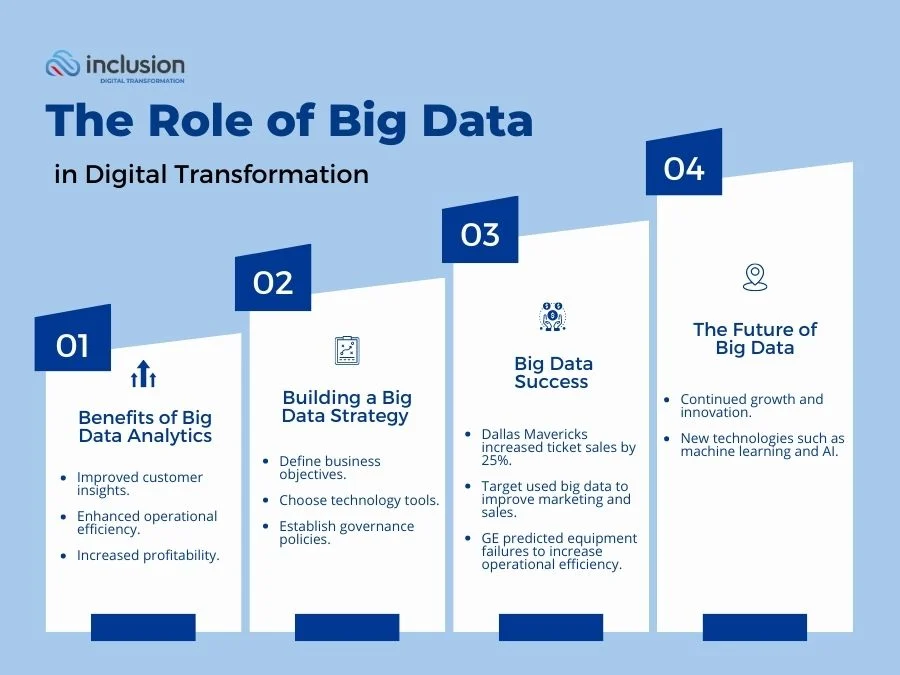In the modern business world, the role of big data in shaping and driving business strategies has become increasingly prominent. Big data, referring to the massive volume of structured and unstructured data that businesses can use to uncover insights and make informed decisions, plays a crucial role in informing strategic planning, market analysis, and customer targeting. By harnessing the power of big data, companies can gain a competitive edge and adapt to rapidly changing market conditions, ultimately driving growth and profitability.
In addition to its impact on strategic planning and market analysis, big data also influences decision-making processes, operational efficiencies, and risk management within organizations. Utilizing advanced analytics and data-driven insights, businesses can optimize their processes, improve resource allocation, and identify potential risks and opportunities. Furthermore, big data enables companies to enhance customer experiences, personalize marketing efforts, and develop innovative products and services that cater to evolving consumer demands. As a result, businesses can stay ahead of the competition and meet the dynamic needs of the market.
1. Improving Decision Making
Big data plays a crucial role in modern business strategies by providing valuable insights that can inform decision making. By analyzing large and complex data sets, businesses can identify patterns, trends, and correlations that would otherwise remain hidden. This allows companies to make more informed and data-driven decisions, leading to improved operational efficiency and strategic planning.
Moreover, big data analytics enables businesses to anticipate market trends, customer preferences, and potential risks, empowering them to proactively adjust their strategies. With the ability to make faster and more accurate decisions, businesses can gain a competitive edge and adapt to rapidly changing market conditions.
2. Enhancing Customer Experience
Big data is instrumental in understanding and improving the customer experience. By analyzing customer data from various sources such as social media, website interactions, and purchase history, businesses can gain valuable insights into customer behavior, preferences, and satisfaction levels. This information can be used to personalize marketing efforts, tailor products and services to customer needs, and optimize the overall customer journey.
Furthermore, big data allows for real-time monitoring of customer feedback and sentiment, enabling businesses to address issues promptly and enhance customer satisfaction. By leveraging big data analytics, businesses can create a seamless and personalized customer experience, ultimately leading to greater customer loyalty and retention.
3. Driving Innovation and Product Development
Big data serves as a catalyst for innovation and product development within businesses. By analyzing market trends, competitor offerings, and consumer insights, companies can identify new opportunities for product innovation and development. Big data analytics can provide valuable input for designing products that align with market demand and customer preferences, ultimately leading to a competitive advantage.
Additionally, big data allows businesses to gather feedback and performance data on existing products, enabling continuous improvement and iteration. Through the utilization of big data, companies can foster a culture of innovation and agility, driving the development of products and services that meet evolving customer needs and market demands.
4. Optimizing Operations and Efficiency
Big data plays a critical role in optimizing business operations and enhancing efficiency. By analyzing operational data, businesses can identify areas for improvement, streamline processes, and reduce inefficiencies. This can encompass various aspects of operations, including supply chain management, resource allocation, and workforce optimization.
Furthermore, big data analytics enables predictive maintenance and risk management by identifying potential issues before they occur, minimizing downtime and operational disruptions. By harnessing the power of big data, businesses can achieve cost savings, improve productivity, and ensure the smooth functioning of their operations.
5. Strengthening Risk Management
Big data empowers businesses to strengthen their risk management strategies by providing valuable insights into potential risks and threats. Through the analysis of diverse data sources, businesses can identify patterns indicative of fraud, cybersecurity breaches, and market fluctuations. This enables proactive risk mitigation and the implementation of robust security measures.
Moreover, big data analytics enables businesses to assess credit risk, detect anomalies in financial transactions, and ensure regulatory compliance. By leveraging big data for risk management, businesses can safeguard their assets, reputation, and overall stability, thereby enhancing their resilience in the face of uncertainties.
6. Personalizing Marketing and Targeting
Big data is instrumental in personalizing marketing efforts and targeting specific customer segments. By analyzing customer data and behavior, businesses can create targeted marketing campaigns that resonate with individual preferences and interests. This level of personalization can significantly increase the effectiveness of marketing initiatives and drive higher engagement and conversion rates.
Furthermore, big data enables businesses to conduct predictive analytics and segmentation, allowing for the identification of high-potential customer segments and the customization of marketing messages accordingly. Through the use of big data, businesses can optimize their marketing spend, maximize ROI, and create meaningful connections with their target audience.
7. Enabling Data-Driven Culture
Big data plays a pivotal role in fostering a data-driven culture within organizations. By leveraging data analytics, businesses can encourage evidence-based decision making and strategic planning at all levels of the organization. This can lead to a mindset shift where data is valued as a strategic asset and used to guide day-to-day operations and long-term initiatives.
Moreover, big data empowers employees with actionable insights and the ability to measure the impact of their actions, fostering accountability and continuous improvement. By promoting a data-driven culture, businesses can harness the full potential of big data and drive innovation, efficiency, and performance across the organization.
8. Harnessing Predictive Analytics
Big data enables businesses to harness the power of predictive analytics, allowing them to forecast future trends, behaviors, and outcomes with a high degree of accuracy. By analyzing historical and real-time data, businesses can make informed predictions regarding customer demand, market dynamics, and competitive landscape. This enables proactive decision making and the ability to capitalize on emerging opportunities.
Furthermore, predictive analytics powered by big data can be applied to various business functions, including sales forecasting, inventory management, and risk assessment. By incorporating predictive analytics into their strategies, businesses can gain a competitive advantage, mitigate potential risks, and stay ahead of market shifts, ultimately driving sustained growth and success.
| Key Points | Description |
|---|---|
| Decision Making | Big data helps businesses make informed decisions by analyzing large volumes of data to identify trends and patterns. |
| Customer Insights | Businesses use big data to gain insights into customer behavior and preferences, allowing for personalized marketing and product development. |
| Operational Efficiency | Big data analysis enables businesses to optimize their operations, reduce costs, and improve overall efficiency. |
| Risk Management | By analyzing diverse data sources, businesses can identify and mitigate potential risks more effectively. |
| Competitive Advantage | Utilizing big data allows businesses to stay ahead of competitors by adapting quickly to market changes and evolving customer needs. |
The Role of Big Data in Modern Business Strategies can be summarized as the use of large-scale data analysis to drive decision making, gain insights into customer behavior, improve operational efficiency, manage risks, and maintain a competitive advantage in the market.



